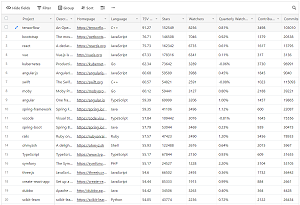News
New Open Source Index: VS Code Is No. 1 Code Editor
Confirming many other studies, trackers and surveys, a new open source project tracker lists Microsoft's Visual Studio Code as the top code editor, clocking in at No. 11 on the list of most popular and fastest-growing GitHub projects.
This ranking comes from Two Sigma Ventures, which launched the new Open Source Index last week.
Right now (March 31), the index shows the TensorFlow machine learning framework at the top.
In addition to VS Code at No. 11, other notable products from Microsoft -- which has made much of its 180-degree turnabout embrace of open source years ago -- include TypeScript (No. 15); ASP.NET Core (No. 24); and PowerShell (No. 40).
Only three of the top 100 projects are written in C#: PowerShell, ASP.NET Core and Shadowsocks for Windows, a fast tunnel proxy, though 10 are written in TypeScript. JavaScript dominates in this and many other indices.
Two Sigma Ventures called out VS Code in its list of highlights presented in a March 25 blog post announcing the Open Source Index.
"VS code is the most popular code editor – VS code has clearly grown in prominence, which we have anecdotally seen internally at Two Sigma. It is the 11th most popular open source project in our Index and is easily the most commonly used code editor among software developers, who love its ease-of-use and customizability."
 [Click on image for larger view.] The Top 20 (source: Two Sigma Ventures).
[Click on image for larger view.] The Top 20 (source: Two Sigma Ventures).
As mentioned, that confirms many other industry findings, including major studies from Stack Overflow (No. 1 development environment in 2019) and GitHub (No. 1 in contributors in 2019).
With the three Microsoft projects mentioned above, the company clocked in as the No. 2 contributor, behind Google (eight projects) and ahead of Facebook and Square (two projects each).
Methodology behind the new index is complicated, producing a weighted scale that takes into account factors such as the number of GitHub "watchers" of a project, contributors, release cadence and more. It's all laid out in the above-linked announcement post.
Looking at similar tools on the web today, the Open Source Contributor Index lists Google as No. 1 and Microsoft as No. 2. GitHub's own Trending index, meanwhile, shows the top items for the day, week and month, with the latter showing ".NET Multi-platform App UI (MAUI)" and "Web Development for Beginners - A Curriculum" in 11th and 12th places.
Other highlights of the report called out by Two Sigma Ventures include:
- Baidu's Apollo project is the fastest growing in our Index – Baidu, unlike US counterparts in the autonomous vehicle space, has taken a collaborative and open approach to developing their self-driving car, working in conjunction with 40 other companies and open sourcing their core technology.
- Startups penetrating the top 100 – Seven of the top 100 projects were created by private, venture-backed startups or are maintained by commercial entities built by the original project creators.
- The dominance of JavaScript – JavaScript has become a dominant web technology in the past decade and this is clearly evident in the top open source projects; 32 of the top 100 projects are written in JavaScript, including 4 of the top 10.
- Kubernetes is here to stay as the default container orchestration technology – as computing infrastructure moves towards containerized architectures, we are excited about the promise of Kubernetes to help developers build more reliable and performant cloud applications.
- The importance of data-driven software – several of the top projects, including the #1 project in our Index, are critical for building end-to-end machine learning and data science workflows.
Two Sigma Ventures is an early-stage venture capital firm with a strong open source presence and internal usage that decided to showcase what it considers to be the most popular and fastest-growing open source projects in the world.
"We hope that the data we publish here, which will be updated regularly, will provide insights for many different types of people in the tech ecosystem – from entrepreneurs, to developers, to anyone interested in studying high-level trends," it said. "Eventually, we plan to add additional pieces of data for each project and allow for more granular filtering and searching and in the coming months we will be publishing more insights and analysis."
About the Author
David Ramel is an editor and writer at Converge 360.